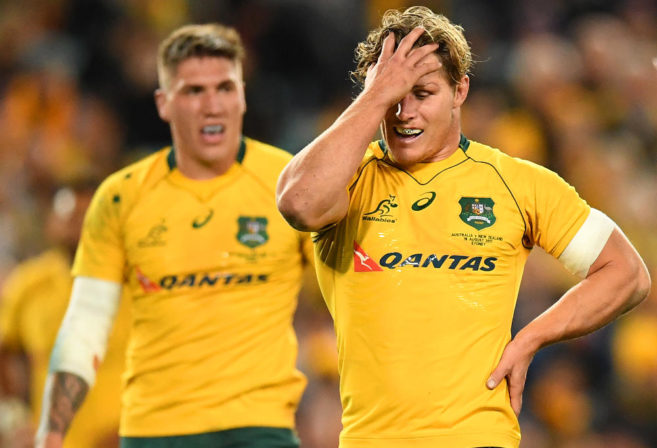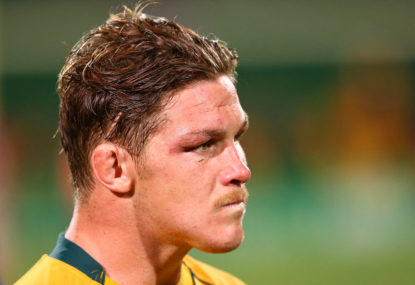There’s been one theme right through Michael Cheika’s rugby and business life – my way or the highway.
In business, it’s been the huge success of his internationally acclaimed fashion house Live Fashion, which is a multi-million dollar concern.
Speaking fluent French, Italian, and Arabic gave him a flying start.
On the rugby field he won seven Shute Shields for Randwick in ten seasons as a player, and one as a coach.
He’s the only coach in history to win major rugby tournaments in both hemispheres, with Leinster taking out the Heineken Cup in 2009 and the Waratahs ending a 19-year drought to capture the 2014 Super Rugby crown.
Cheika took over as Wallabies coach in November 2014 following Ewen McKenzie’s shock resignation. He ended 2015 capturing the Rugby Championship by beating the All Blacks at his first attempt, reaching the Rugby World Cup final, and being awarded the World Rugby coach of the year.
At that stage, Cheika had taken charge of 16 Wallabies Tests for 11 wins, with a 68.75 per cent success rate. That stat was right up with the best coaching stats of all time.
But since the Rugby World Cup final, Cheika’s successes have taken a nose dive, and for the first time in his rugby and business life, he’s under the pump. From recording a 68.75 per cent success rate, Cheika’s had just nine wins from 22 Tests for a 40.90 per cent success since.
And whether Cheika wants to believe it or not, the crash is directly linked to Stephen Moore and Michael Hooper’s captaincy.
Both broke through as captain on McKenzie’s watch in 2014, but Moore’s about to retire, so the bulk of Hooper’s captaincy stats have been on Cheika’s watch, especially over the last 22 internationals.
Hooper has captained the Wallabies 18 times for just six wins – his success rate a mere 33.33 per cent. Why Cheika has overlooked that stark stat defies description.

(AAP Image/Dean Lewins)
It’s even worse if he’d concentrated on Hooper’s captaincy of the Waratahs, and the Rugby Championship just this year.
The Waratahs won only four from 15 in the Super Rugby, and just one from four in the Rugby Championship. That’s 19 games in 2017 for just five wins at 26.31 per cent.
Not good enough by any stretch of the imagination.
It’s no coincidence the three most successful Wallabies captains were coached by the three most successful coaches – or the three most successful coaches appointed the three most successful captains, take your pick.
The most successful coach has been Rod Macqueen, the most successful captain John Eales.
Macqueen’s record is superb with 32 wins from 40 for 80 per cent – Eales boasts 41 wins from 55 for 74.55 per cent.
Between them, they won the 1999 Rugby World Cup, four Bledisloes in 1998, 1999, 2000, and 2001, two Tri-Nations in 2000 and 2001, and the historic 2001 series win over the British and Irish Lions.
They won the lot, the ARU trophy cabinet was never so chockers.
The second most successful Wallabies coach is Alan Jones, and the second most successful captain Andy Slack.
Jones won 21 of 30 Tests for 70 per cent, Slack had 14 of 19 for 73.67.
They combined to win Australia’s only Grand Slam in 1984, beating England 19-3, Ireland 16-9, Wales 28-9, and Scotland 37-12 – posting 100 points to just 33.
The Wallabies were not only a brilliant attacking unit in crossing for 12 tries – with the mercurial Mark Ella scoring in all four internationals – but the Wallabies were also a superb defensive side in allowing just one try by the Welsh.
The Jones-Slack combination also won the Bledisloe in 1986, but only reached the semis of the 1987 inaugural Rugby World Cup due to Jones embarking on his radio broadcasting career, when rugby was still amateur.
The third best duo was Bobby Dwyer and Nick Farr-Jones. They won the 1991 Rugby World Cup and the 1992 and 1994 Bledisloes.
Dwyer, in two stints, coached 73 times for 46 wins – 63 per cent – Farr-Jones captained 36 times for 23 wins at 63.89 per cent.
So Michael Cheika, while your way or the highway has been successful in other fields, if you want to finish your Wallabies coaching career among the elite, you simply can’t carry Michael Hooper as well.






























































































